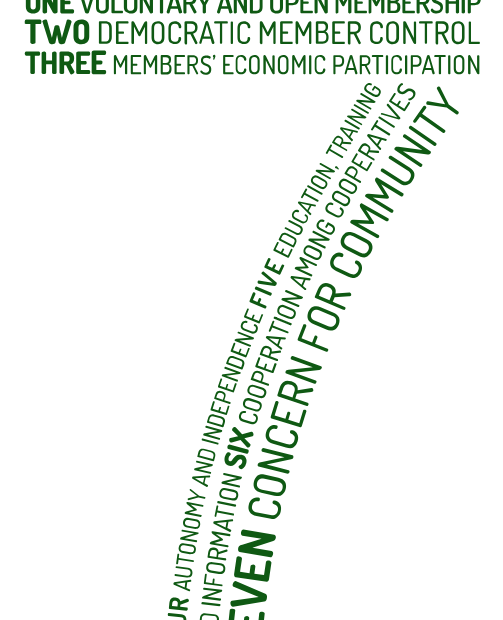We are building an online cooperative marketplace for the artisan community. But what does “cooperative” mean? In this post, we give a basic introduction the cooperative business model.
Simply put, a cooperative (co-op) is a business that is owned and managed by its member-owners as a “one-member / one-vote” democracy. All co-ops are operated by a common set of values that put people over profits. In contrast to traditional companies, there can be no concentration of ownership among a few. All members equitably share the annual profits.
The cooperative business model evolved during the Industrial Revolution. The earliest recorded cooperatives started in the late 1700’s, around the same time America was born. At first, the cooperative business model was experimental, and failures were more frequent.
Then in 1844, a group of artisan weavers in England established the first modern cooperative business model. The “Rochedale Pioneers” created a cooperative store for its members who wanted to buy “honest food at honest prices.” All members shared the profits at the end of the year, receiving patronage refunds.
The Pioneers wrote the Seven Cooperative Principles that are still used as the blueprint for cooperatives today. These principles are internationally-recognized and standard at modern cooperatives. It is these principles that differentiate cooperatives from other kinds of businesses:

- Voluntary and Open Membership: Cooperatives are voluntary organizations open to all persons able to use their services and willing to accept the responsibilities of membership.
- Democratic Member Control: Members actively participate in setting policies and making decisions.
- Members’ Economic Participation: Members contribute equitably to, and democratically control, the finances of their cooperative.
- Autonomy and Independence: Cooperatives are self-directed, self-help organizations controlled by their members.
- Education, Training, and Information: Cooperatives provide education and training internally and externally. Internal education is so all can contribute effectively to the development of their cooperatives. Externally cooperatives educate the general public about the nature and benefits of cooperation.
- Cooperation Among Cooperatives: Cooperatives strengthen the cooperative movement by working together.
- Concern for Community: Cooperatives care about the local communities outside of the organization.
Today there are at least 1.2 billion cooperative members of over 3 million active cooperatives on the planet. These numbers are tracked by the International Cooperative Alliance.
In America, cooperatives are ubiquitous but often go unrecognized. According to a study by the University of Wisconsin’s Center for Cooperatives, there are over 40,000 cooperatives in the US at more than 8,800 locations.
Cooperatives in the US include thousands of small local businesses as well as successful household names you’ve heard of. Major retail cooperatives include ACE Hardware, Land O’Lakes, REI, King Arthur Baking, Bob’s Red Mill, and Tillamook Cheese. They also include rural Grange halls, urban natural foods stores started in the 1960’s and 1970’s, credit unions, and electric co-ops. Electric co-ops together power over 56% of the nation’s landmass in 92% of persistent poverty counties.
Cooperatives are a proven business model run by equitable and inclusive values. In the words of John Curl, “Worker cooperatives offer a way for people to get out of the boss system entirely, and to reorganize their lives on a different basis. They proffer group self-employment to people without the resources to start a business alone.”
The cooperative model is relatively simple. Yet if there were more cooperatives in the world, the impacts would be profound. The United Nations (UN) announced 2012 as the Year of the Co-op for an important reason: cooperatives are uniquely beneficial to individuals and society.
Next, announcing our plans for a cooperative online marketplace for artisans.
RESOURCES / FURTHER READING:
- Cooperative Principles: Alberta Community & Co-operative Association
- Curl, John. For All the People: Uncovering the Hidden History of Cooperation, Cooperative Movements, and Communalism in America. PM Press, 2009.
- International Cooperative Alliance
- National Cooperative Business Association / CLUSA International
- Rochedale Pioneers (Video Link)
- The United Nations International Day of Cooperation
- The University of Wisconsin’s Center for Cooperatives

Pingback: We're Building A Co-op Marketplace For Artisans Online: Join Us! | Artisans Cooperative
Pingback: What Makes Our Artisan Marketplace Different | Artisans Cooperative
Pingback: Union Vs Guild Vs Cooperative Vs Collective - What’s The Difference? | Artisans Cooperative
Pingback: Artisans Cooperative: Building a Handmade Alternative to Etsy | the official blog of Walnut Studiolo
Pingback: Etsy Alternatives You Can Try Right Now (2022) | Artisans Cooperative
Pingback: Walnut Becomes a Founding Member of Artisans Cooperative: a Better Handmade Marketplace | the official blog of Walnut Studiolo
Pingback: Outreach Templates That Work! Share With Your Community | Artisans Cooperative